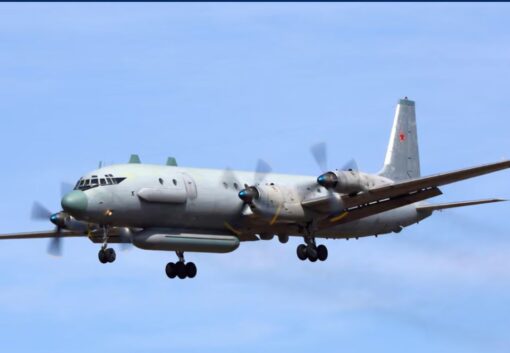The Estonian government has accused Russia of violating its sovereign airspace in what officials are calling a dangerous provocation that could destabilize the entire Baltic region.
Foreign Minister Margus Tsahkna delivered the sharp warning after Estonian military radar confirmed that a Russian aircraft entered and briefly remained within Estonian territory before being escorted away.
The incident comes at a moment of heightened security concerns across Eastern Europe, with NATO allies intensifying air patrols and regional leaders warning that Moscow is deliberately testing the resolve of the alliance.
“The situation has become untenable,” Tsahkna said during a press briefing in Tallinn. “Every Russian airspace violation brings Europe one step closer to conflict. This is not an isolated mistake, but part of a calculated pattern of aggression. Estonia will not remain silent, and we expect a firm response from our partners in NATO and the European Union.”
His comments underscore growing fears that Moscow is deliberately escalating tensions at Europe’s northeastern frontier, a region viewed as one of the most vulnerable flashpoints between Russia and NATO.

Military officials in Estonia confirmed that the aircraft involved was an Ilyushin reconnaissance plane that flew without submitting a flight plan, kept its transponder switched off, and ignored multiple attempts at communication.
Estonian fighter jets scrambled to intercept the plane and escorted it back across the border after several minutes. While no shots were fired, Tallinn described the incident as a serious breach of international law and vowed to raise the matter at NATO headquarters in Brussels.
The Russian airspace violation has set off alarms across the Baltic states, which have long warned that Moscow uses such tactics not only for intelligence-gathering but also for testing alliance response times.
Lithuania and Latvia issued statements of solidarity with Estonia, with Latvia’s foreign minister declaring that “these repeated intrusions are no accident. They are designed to intimidate, to provoke, and to undermine our collective security.” Lithuania’s president echoed the sentiment, urging NATO to “treat this violation with the seriousness it deserves.”
In Moscow, the Russian Defense Ministry dismissed the allegations as “baseless” and insisted that its aircraft “remained at all times in international airspace.” Kremlin spokesperson Dmitry Peskov accused Estonia of “staging political theater to inflame anti-Russian hysteria.”
Yet Western officials noted that the Kremlin has routinely denied similar incidents, even as NATO air policing reports show a sharp increase in Russian flights near and across alliance borders since the start of the war in Ukraine.
For Estonia, which shares a 294-kilometer border with Russia, the incursion is a stark reminder of its vulnerability. Public sentiment has hardened since the invasion of Ukraine in 2022, and many Estonians view the latest Russian airspace violation as part of the same pattern of disregard for sovereignty and international norms.
“Our people understand that what happened in Ukraine can happen here if we are not vigilant,” said one parliamentarian in Tallinn. “This is why we are calling on NATO to strengthen its permanent presence in the Baltic states. Deterrence is the only language Moscow respects.”
NATO officials confirmed that the alliance is monitoring the situation closely. A spokesperson in Brussels said the violation “follows a concerning trend of Russian military activity near allied territory” and reaffirmed that NATO’s commitment to defending every inch of its members’ land, sea, and airspace remains “ironclad.”
The alliance currently maintains enhanced forward presence battlegroups in Estonia, Latvia, Lithuania, and Poland, backed by a rotating schedule of air patrols conducted by allied nations. Analysts say that incidents like this one could increase calls for even more permanent deployments.
The European Union also condemned the intrusion, with EU foreign policy chief Josep Borrell describing it as “a reckless act that endangers European security and stability.”
He added, “respect for sovereignty and territorial integrity are non-negotiable principles. The EU stands firmly with Estonia.” Several European capitals, including Berlin and Paris, released statements of support, urging Moscow to refrain from further provocations.
The timing of the Russian airspace violation has led some observers to speculate that it was meant to coincide with a high-level NATO meeting scheduled in Warsaw this week, where defense ministers are set to discuss further military aid to Ukraine and security measures for the eastern flank.
“It is not a coincidence,” said a regional security analyst based in Riga. “Moscow knows how to send signals, and this was a clear one: Russia is reminding NATO that it can create instability on multiple fronts simultaneously.”
For ordinary Estonians, the incident has stirred both anger and anxiety. In Tallinn’s central square, residents spoke of growing unease. “We feel like we are always on the front line,” said one teacher.
“Every time we hear about a violation, we wonder if this is the beginning of something bigger.” Another resident added, “It is frightening, but at the same time, we trust NATO will defend us. Still, it feels like Russia is pushing more and more each day.”
Diplomatic efforts to de-escalate appear unlikely in the near term. Relations between Estonia and Russia have been virtually frozen since the invasion of Ukraine, with embassies operating at minimal levels and trade ties severed.
Tallinn has been among the loudest voices in Europe pushing for stronger sanctions against Moscow and greater military support for Kyiv. Russia, in turn, has labeled Estonia and its Baltic neighbors as “Russophobic” and accused them of acting as proxies for US policy in Europe.
Some analysts warn that while the airspace violation may not immediately trigger a direct conflict, it contributes to a dangerous cycle of escalation. “Each time a Russian aircraft crosses into NATO airspace, the risk of miscalculation rises,” said a former NATO commander. “A single mistake, a miscommunication, or an accidental engagement could spiral into something catastrophic. That is why these provocations are so dangerous.”
The Russian airspace violation is not the first Estonia has faced in recent years, but officials say it was more brazen than usual. Tallinn has documented dozens of similar intrusions since 2014, when Russia annexed Crimea, but the current war in Ukraine has given new urgency to these warnings.
Estonian leaders argue that ignoring such actions only emboldens Moscow further. “We cannot normalize aggression,” Foreign Minister Tsahkna insisted. “Every violation must be met with unity and resolve, or else we risk repeating the mistakes that allowed Russia to believe it could invade Ukraine without consequences.”

As Europe braces for what many see as a prolonged standoff with Russia, the Baltic states remain among the most exposed members of NATO.
The airspace violation over Estonia has become more than a technical breach of aviation rules; it is seen as a deliberate test of wills between Moscow and the West. The outcome of that test will depend on how firmly Europe and its allies respond in the coming days.


